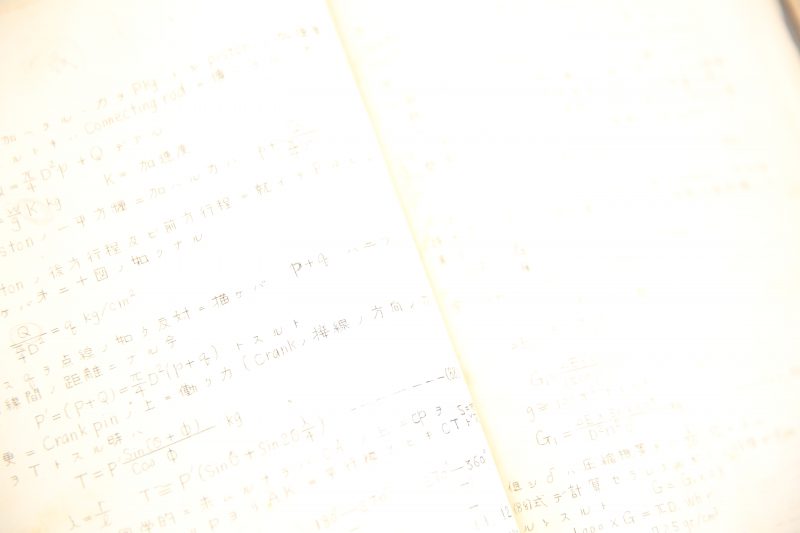niime 百科
Encyclopedia of niime
直観が大事。
An intuitive sense is necessary.

2019 . 07 . 15
播州織産地に移り住んだ玉木は織物職人・西角博文さんとの頻繁なやり取りによる生地開発が可能になり、試行錯誤の末にtamaki niimeの代表作となるonly one shawl を生み出した。 だが播州織の生き字引である西角さんから玉木が学び取り、その独特のモノづくり手法のヒントとしたのはそれだけではなかった。 鋭く柔軟な感性・直観で、些細なものごとや会話から大きな学びを得て判断を下しブランド構築と経営に繋げてゆく玉木と酒井に話を聞く。 玉木「西角さんに色々と教わったことで今のウチのカタチになったところがある。私自身はあまりアイデアマンじゃないから、人から教えてもらってよしやってみよう!という事が多い。西角さんが播州織の歴史をすごく教えてくれて、昔自分がちっちゃかった頃は親が糸の染めもやってたし、それを乾かして織って、それを大阪まで売りに行ってて、それの繰り返しだったんだよという話をしてくれて。えーっ!それ出来るんだ!と思って。」 ― その話が織りだけじゃなく、染めから何から播州織の工程を自社でこなすという、今のスタイルに行き着くすごいヒントになったわけですね。 玉木「それでいいんだと。いま分業になってるのは、分業じゃないといけなくて、それしか選択肢が無いように感じちゃうけど、時代に応じて業態が変化したカタチが現在の産地の姿であって。」 ― 大量生産の時代に対応して産地としての分業のシステムが構築されたという事なんでしょうね。 玉木「そう。もともとそうじゃなかったってゆうのがわかったのは、全部自分たちで出来るんだと思ってすごくワクワクした。(酒井に)じゃあやろう、となったな?」 酒井「うん。」 玉木「色んなハードルは付きまとうけどね、織機の部品が足り無いとか。そこはひとつひとつ解決して。昔は出来たんなら今も出来るはずだって。それでやってるね?」 酒井「うん。」 ― 新しい発想のヒントは何かしら目の前に転がっているというわけですね。 玉木「タイミングによってやっぱり色んな出会いはあるよね。なんか降りてくるというよりは人から教えてもらう場合が多い。」 ― それをモノにするのがすごいですね。 玉木「モノには直ぐするよ。」 ― 普通はしないじゃないですか? 玉木「そうなの?いいこと教えてもらった、じゃあやってみようかってことなんだけど。」 ― そのあたりはワクワクしながら二人のディスカッションで? 酒井「いやぁ、そこはこの人単独ですよ。」 玉木「ワクワクは私。」 ― 玉木さんから酒井さんに問いかけをすると? 玉木「いい?って確認だけする。」 酒井「うん。」 玉木「やれば、って。駄目な時は駄目だって言ってくる。」 ― ジャッジがシンプルですね、すごく。 玉木「駄目と言われて、あ、そうかと考え直してちょっと間違ってたなということもある。」 ― う〜ん、なるほど。その辺のジャッジはほぼほぼ外れてないってことなんでしょうか。 酒井「まぁ、外れてないから今があるんやろうな?」 玉木「間違ってたって時も軌道修正は二人でディスカッションして完了するよね。私の伝え方が足りなくてそれ駄目なんじゃない、って言われた時は補足して説明すればそれなら良いんじゃないとなるし。でも、この人はもう“直観”だと思う。」 酒井「最近ちょこちょこ本を読むんですけど、確かに読んでて面白いんですけど、本を読むとね、なんかもう、隅から隅まで“完成”されてて面白くないでしょう?」 ―本としてまとめてあって完成されてますよね。 酒井「自伝にしてもビジネス書にしても、それ以外の小説にしても、なんかもう、概念のかたまりでしょう。あれって直観力を鈍らせるね。」 玉木「決め付けられるから?」 酒井「そう。」 ― ある種“刷り込み”が入るというか? 酒井「そうなんですよ。」 玉木「私が本を読んで吸収して良いと思うところの要点をこれとこれとこれって酒井に伝えてウチも取り入れようよと言うと、いいんじゃないってなるけど。」 ― 酒井さんの場合、最初ショールを世に出した時のように、“tamaki niimeを全国に広めたい、その後は世界へ行きたい。”というシンプルなワードを玉木さんが伝えるだけで全てわかって色々出来てしまうわけですもんね。 酒井「インプットは断片的なのが良いですね。」 玉木「それで考えて構築しちゃうからね。」 ― 以前、言葉じゃなくてテレパシーで会話出来るようになれば、と言ってましたよね。 酒井「そうそう。その方が無茶楽ですね。」 玉木「あなたの場合は直観で良いんじゃない?」 酒井「直観力もある意味特殊能力やな。」 玉木「最近酒井と話してるのは、今結局何してるのかっていうと、人を育ててるんだろうなって。直観力も踏まえて考える人。 こないだ『秘書力』の著書の井出元子さんがウチに来られた時に仰ってたんですけど、tabe roomに入る時にまずスリッパを選ぶ。そんな行為は普通の会社ではありません、と。で、器を選ぶ。えっ、選ばせてもらえるんですか?みたいな。そのダブルで選ぶことが出来ることでテンション上がっちゃったみたいで。」 ― そのワクワク感ありますよね。 玉木「よく考えたら会社に勤めてて朝出勤して仕事して帰って来るまでの間に自分で何かを選ぶなんて行為をした覚えがないって言うの。決められたことを決められてるようにキッチリとやる事はしていても、何でも良いよ好きなことやって、ということとか、この中から好きなの選んでくださいという仕事のやり方は基本的にない。」 ― 確かに日々のルーティンが決まっている感じでしょうね。 玉木「そうなの。だからそれで感性を育てるなんてことは無理だと。ウチはそこからもうすでに脳を使ってほしいし、自分がその方が楽しいから、スリッパもお皿も選びたいし、食べる量だって自分で選びたいから、自分で好きなように取るってゆうのを、あえて毎日の日常に入れ込んじゃってるから。」 ― そこまで考えてやってたんですね…。 玉木「いやそんな特別に考えてないんだけど(笑)、井出さん曰くそうなんだって。」 ― そこは考えるというより、直観なんでしょうね。 玉木「直観でそうしてた。そうなんだ、皆んなこれが普通じゃないんだって。私たちは今これが普通になっちゃってるから。」 ― そう考えるとスリッパのチョイスとお皿のチョイスと…組み合わせると何パターンあるのかって話ですよね。メニューを選ぶのも含めて。」 玉木「そう。すごい組み合わせの数になるね。」 ― 楽しいですね。毎日異なるわけだから。 玉木「そうやって感性だったり脳を刺激することで脳は進化して行くから。やっぱり今の世の中、選ぶ・判断する、考える機会がないってゆうことが人を退化させる原因ですねと。確かに。」 ― なるほど。ちょっとした選択からでもワクワク感がもたらされ、脳が刺激されるわけですね。 玉木「(酒井に)だからあなたもよくスタッフに言うよね、通勤路を毎日変えろとかね。」 酒井「うん。」 玉木「毎日同じ行動しちゃうと人間、脳が退化しちゃうから、意識的に脳に筋トレをさせた方がいい。」 ― それは目からウロコですね。 玉木「言われて私も、あ、そうかそれって当たり前じゃないんだと思って。」 ― tamaki niime的あたり前なんですね。 玉木「そう、それがウチの常識。」 ― でも世間一般の職場では常識じゃないと。 玉木「だからそうゆうのを増やしていったらウチは感性を育む施設になるんじゃないかと。」 ― ヒントはごく些細なところにあるわけですね。 玉木「そう。だからウチに来てtamaki niimeを体験してもらうというのも色んなことで出来るんだと。」 ― 西角さんから播州織の昔話を聞いてそれを活かしたことにしても、ヒントはその辺に転がっていて、それをキャッチする感性が… 玉木「あるかないか。」 ― 直観で。あと実行力と。 玉木「そういうことだと思う。西角さんだってたくさんの人に同じ話してると思うし、私だけに教えてるわけじゃ全然ないのに。やるかやらないかだけだし、それを面白いと思えるかどうか。」 ― なるほど。いやぁ、良い話になりました。 玉木「感性を育てる。その方法は?」 酒井「いかに直観で生きるかやと思う。」
書き人越川誠司
An intuitive sense is necessary. Tamaki moved to the home of Banshu-ori, which made it possible for her to have intense interactions with the Banshu-ori craftsman Nishikaku to create fabrics. After trials and errors, she finally produced the ‘only one shawl’; the representative creation of ‘tamiki niime’. However, it was not the only thing Tamaki learned from Nishikuru; a walking dictionary of Banshu-Ori, and hinted at its unique manufacturing techniques. I’d like to listen to Tamaki and Sakai, who has learnt a lot and made decisions via little things and conversation with sharp and flexible sensibility and intuitive sense to build their brand and management.
- Tamaki
- “I learnt a lot from Mr.Nishikaku, and it made us how we are. I’m not a person of ideas, so if someone teaches me, I feel like doing it. Mr.Nishikado taught me the history of Banshu-ori. When he was small, his parents dyed the yarns, dried and weaved them. Then they took them to Osaka to sell. That’s how they did it, repeatedly. I was surprised to know that they could do that! “
- Tamaki
- “I fully understood. The current style; the division of labour is not essential. I felt there was no choice; however, the current style of the production area has changed eventually according to the era.”
– It seems that the system of division in the production area has a built-in response to the era of mass production.
- Tamaki
- “Yes. I was very excited to learn that we could do it all by ourselves since the system did not formerly exist. (To Sakai) We decided to do it. “
- Sakai
- “That’s right.”
- Tamaki
- “We always have some sorts of hurdles to get past. For example, the loom parts were missing. We have been solving that little by little. If the people were able to do it in the past, we should be able to do it now. That’s what we are doing.”
- Sakai
- “Yeah.”
– You mean that some hints of new ideas are somewhere around you.
- Tamaki
- “It all depends on the timing to have various encounters. Someone usually teaches me rather than an idea pops up into my head.”
– I think you have the ability to master it.
- Tamaki
- “It’s easy for me.”
– Usually, people can’t.
- Tamaki
- “Really? When someone tells me something useful, I simply would like to try. That’s all.”
– In that case, do you two have exciting discussions?
- Sakai
- “No. Only she gets excited.”
- Tamaki
- “Only me.”
– When Tamaki askes Sakai?
- Tamaki
- “I just want a confirmation.”
- Sakai
- “Yeah.”
- Tamaki
- “He says yes. However, if it is not good enough for ‘tamaki niime’, he says no.”
– It’s that simple, isn’t it?
- Tamaki
- “When I was told not to do it, I sometimes realize I was wrong.”
– I see. I guess the judgement does not change much, right?
- Sakai
- “I guess we have been doing well, so we are here now.”
- Tamaki
- “When we made mistakes, we discussed and decided what to do. When I was told no because I did not explain enough, I added more explanations to convince him. After all, he has ‘an intuitive sense’.”
- Sakai
- “Recently, I’ve been reading books quite often. It is interesting in a way; however, they are totally ‘completed’ from corner to corner. So, it’s not appealing.”
– Books are all edited and so completed.
- Sakai
- “Autobiographical books, business books, or other novels all have their concepts. They dull the intuitive sense.”
- Tamaki
- “Because they are written definitively.”
- Sakai
- “Yes.”
– In a way, it is some sort of “imprinting”, isn’t it?
- Sakai
- That’s right.
- Tamaki
- “If I read a book, and then absorb and summarize it for Sakai, and tell him it is good to bring it into our company, he would say yes.”
– Just like when you first released the shawl to the world, Sakai could understand all with the simple words “I’d like to spread ‘tamaki niime’ to the whole country, and then I’d like to go to the world.” He did everything afterwards.
- Sakai
- “I prefer fragmental input.”
- Tamaki
- “That’s how you think and build your idea.”
– You used to say that you wished to talk in telepathy, not in words.
- Sakai
- “Yeah. That’s much easier.”
- Tamaki
- “In your case, you only need an intuitive sense, don’t you?”
- Sakai
- “It is a special ability, in a way.”
- Tamaki
- “Lately, I’ve been talking to Sakai about what we’re doing now…. we are raising people. People who can think with intuitive sense. The other day, when Motoko Ide, who is the author of the book “The Secretarial Power” visited us, she walked into ‘tabe room’. She had to choose slippers, which is not an ordinary thing. She was even surprised at choosing eating utensils by herself…like choosing the plate? She got excited by having two options. “
– I understand that feeling.
- Tamaki
- “She said while she was working for a company; from going to work in the morning to coming home in the evening, she didn’t remember choosing something by herself. She had to do anything neatly, which is already decided at the office; however, there was basically no other way to work with any options anyone liked.”
– It sounds like a daily routine has already set.
- Tamaki
- “Yes, so it’s impossible to raise sensibility. I’d like them to use their brains from there because it is fun for me. I want to choose slippers and plates and how much I eat. I dare put it into everyday life because I’d like to choose myself,”
– I didn’t know you’ve been thinking in-depth…
- Tamaki
- “No, I don’t think about it, particularly. (laugh) Ms.Ide said so.”
– It’s more intuitive than thought.
- Tamaki
- “I did it by intuition. I didn’t know this was not normal for people. Now, this is normal for us. “
– Well, I wonder how many ways there are when you combine the choice of slippers and dishes…including choosing menus.”
- Tamaki
- “Yes, it’s a great number of combinations.”
– It sounds like fun. It’s different every day.
- Tamaki
- That’s how the brain evolves by being sensuous or stimulated. After all, there is no chance to choose, judge or think, in the world today. That it is the cause of degeneration of people. I’m sure.”
– I see. Even little choices bring excitement and stimulate the brain, right?
- Tamaki
- “(To Sakai) So you often tell the staff, change commuting routes every day.”
- Sakai
- “Yes.”
- Tamaki
- “Because if you do the same thing every day, the brain will degenerate, so it is better to do muscle training in the brain consciously.”
– I learn much from that.
- Tamaki
- “Well, actually, I thought it was natch.”
– That’s only natural for ‘tamaki niime’, isn’t it?
- Tamaki
- “Yes. That is our common sense.”
– But it’s not common in the general workplace.
- Tamaki
- “So if we do more, I guess we will become a facility that fosters sensitivity.”
– The tips are from simple things.
- Tamaki
- “Yes. So people can do various things when people come to our place to experience ‘tamaki niime’.”
– When you listened to the history of Banshu-ori from Mr. Nishikaku and made use of it, you had the sensitivity to catch the hint that was rolling here and there…
- Tamaki
- “If you have the sense or not.”
– Intuition. And action.
- Tamaki
- “Exactly. Mr. Nishikaku told the same story to lots of people, not just to me. It depends. Either you do it or not. Or I should say if you are interested in it or not.”
– I see. Oh, it was a beautiful story.
- Tamaki
- “To grow sensibility. How?”
- Sakai
- “To live with intuition.”
Original Japanese text by Seiji Koshikawa.
English translation by Adam & Michiko Whipple.


